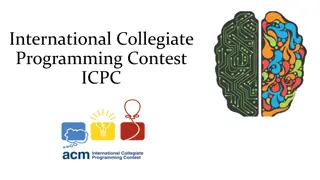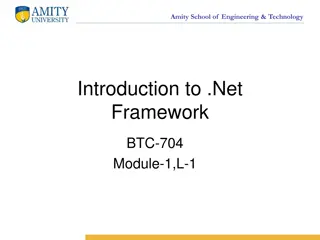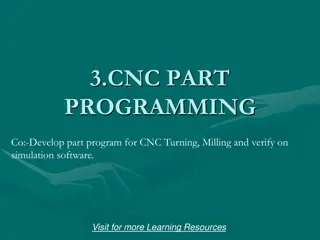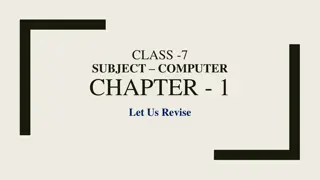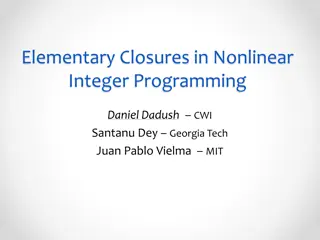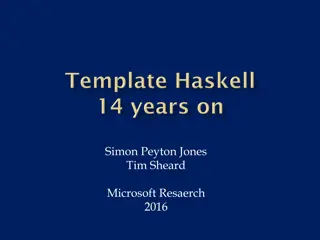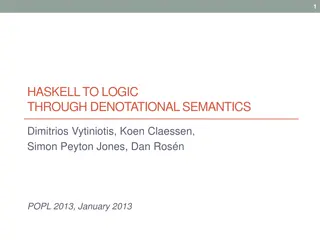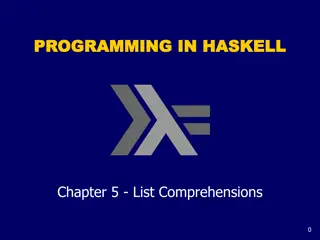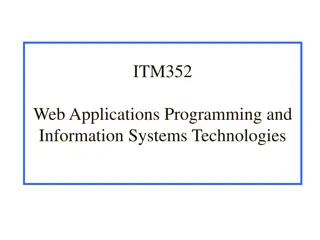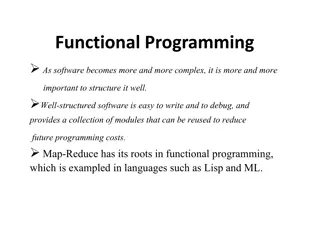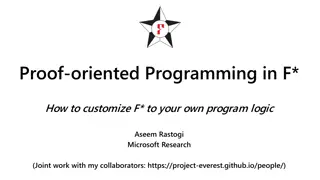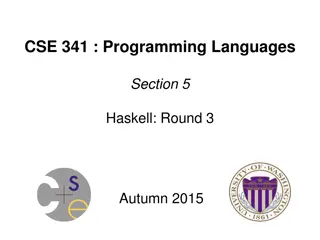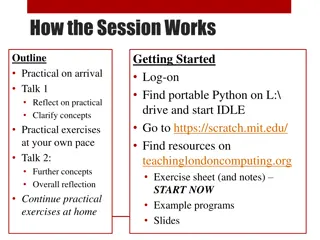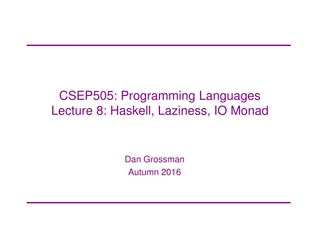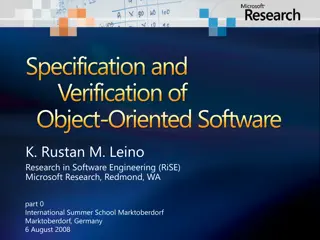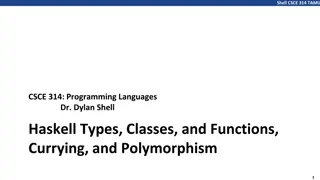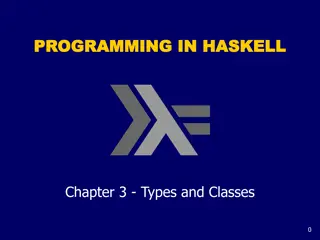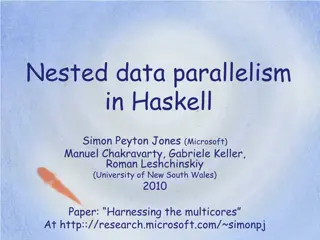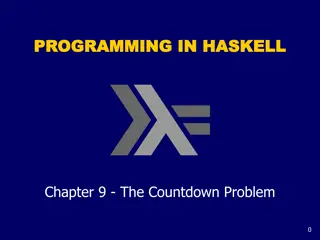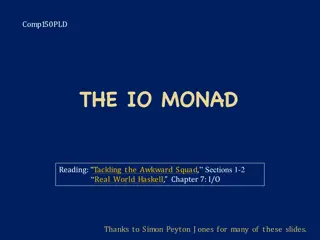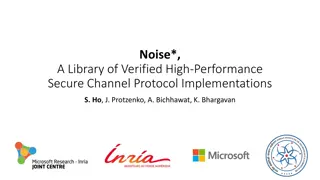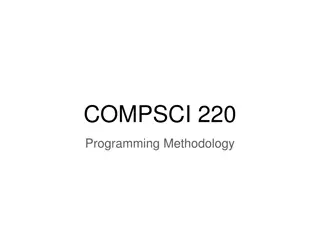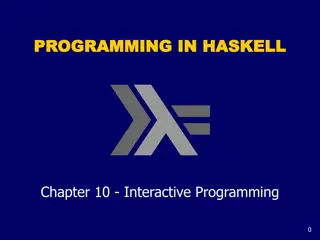Functional Programming
Functional programming, a paradigm that emphasizes declarative programming, pure functions, and limited side effects. Explore the benefits and characteristics of functional programming languages.
0 views • 20 slides
Programming in C: Overview and Constants Explanation
Programming in C is a fundamental introductory guide to the C programming language. It covers the basics of C, including its development history, character set, constants, and rules for constructing constants like integer and real constants. Dr. M. A. JAMAL MOHAMED YASEEN ZUBEIR, an Assistant Profes
4 views • 33 slides
International Collegiate Programming Contest (ICPC) Overview and Rules
The International Collegiate Programming Contest (ICPC) is a prestigious global competition in competitive programming supported by major tech companies like Google and Facebook. Participants tackle logical and mathematical problems by developing efficient algorithms and implementing them in various
5 views • 17 slides
Decision Analysis and Operations Research in Management
This content delves into Management Decision Analysis and Operations Research techniques such as Linear Programming, Integer Linear Programming, Dynamic Programming, Nonlinear Programming, and Network Programming. It covers the phases of an Operations Research study, mathematical modeling for decisi
0 views • 36 slides
Introduction to Amity School of Engineering & Technology
Amity School of Engineering & Technology offers courses in .NET Framework, Windows GUI development, C/C++ programming, Visual Basic, and Java/J2EE programming. The curriculum covers topics such as Win32 API, MFC, object-oriented programming, and web development. Students learn to develop application
1 views • 14 slides
Module 2: PSEA and Safe Programming Training of Trainers (ToT) by CRS HRD
This Module 2 focuses on PSEA and Safe Programming, covering key sessions on understanding safe programming, identifying protection and SEA risks, and mitigating risks. It emphasizes the importance of safe programming in increasing safety, dignity, and access, with staff playing a crucial role. Part
3 views • 19 slides
Comprehensive Guide to CNC Part Programming
Learn about CNC part programming for turning and milling machines. Understand the importance of part programs, program input devices, machine control unit functions, and CNC programming methods like offline and conversational programming. Explore the Cartesian coordinate system, tool positioning, an
0 views • 61 slides
Computer Programming: Basics and Beyond
In this chapter, we delve into the fundamental concepts of computer programming. We explore the definition of a program, the role of programming languages, types of programming languages, and generations of programming languages. Additionally, an assignment is provided to reinforce the key learnings
0 views • 25 slides
Advances in Integer Linear Programming and Closure Techniques
Explore cutting planes, convex integer programming, Chvátal-Gomory cuts, and closure methods in nonlinear integer programming. Discover how these techniques enhance the efficiency and effectiveness of integer programming models, leading to substantial progress and improved solutions.
1 views • 40 slides
Object-Oriented Programming (OOP) in Python
Python is a versatile programming language that supports various programming approaches. Object-Oriented Programming (OOP) is a popular method in Python where objects are created to solve programming problems. OOP in Python focuses on creating reusable code, following the principle of DRY (Don't Rep
2 views • 35 slides
Introduction to Computers and C++ Programming Lecture 1 - Overview and Basics
This lecture covers the fundamental concepts in computer systems and programming using C++. Topics include the main components of a computer, bytes and addresses in memory, computer systems hardware and software, understanding programs, programming languages, compilers, preparing and running C++ pro
2 views • 21 slides
Web Application Development and Programming CTE Program Overview
Viera High School offers a comprehensive CTE program in Web Application Development and Programming, taught by Mr. Dohmen. Students learn popular programming languages like Python, SQL, JavaScript, Java, C#, and C. The courses cover web programming, JavaScripting, and PHP programming, providing cert
3 views • 7 slides
Introduction to Programming with RobotC in Robotics Education
Programming in robotics involves giving specific directions to a robot using software like RobotC. This introduction covers the basics of programming, software organization, and how to get started with RobotC through creating flow charts and programming tasks. Learn about setting up RobotC, creating
1 views • 8 slides
Introduction to Programming and Computer Instructions
Programming is the process of creating instructions for computers to follow and accomplish tasks. It involves turning human language instructions into detailed binary machine language. Before learning programming, individuals may have different levels of experience, ranging from no experience to pro
0 views • 16 slides
Development of Attosecond Theory for Nobel Prize through Verilog Programming
Attosecond generation is a crucial technique for creating attosecond pulses by manipulating radiation waves. This research paper focuses on developing the Attosecond generation equation through Verilog programming and validating it using test programming techniques. The interface between equations,
2 views • 15 slides
Meta-programming in Haskell: A Closer Look at Splices and Quotations
Explore the world of meta-programming in Haskell through splices and quotations. Learn about successful extensions introduced by Simon Peyton Jones and Tim Sheard, including practical examples like generating source code using splices that are type-checked and compiled at compile time. Dive into con
2 views • 45 slides
Automated Static Verification of Higher-order Functional Programs
Explore the automated static verification of higher-order functional programs, focusing on Haskell code. Learn about denotational semantics, program assertions, and tools like GHC for verification. Discover the emphasis on simplicity and structural properties for easy proofs. Consider utilizing exis
0 views • 22 slides
CS252 Systems Programming Course Overview
This course overview covers topics such as C programming review, Unix basics, Unix systems programming, and grading details. The course includes labs on C/C++ programming, Unix shell scripting, and writing your own shell. Communication is emphasized through Piazza for questions/answers and Blackboar
0 views • 41 slides
List Comprehensions in Haskell Programming
In Haskell programming, list comprehensions provide a concise way to construct new lists from existing ones. By following comprehension notation similar to mathematics, you can generate sets and lists based on specified criteria. The order of generators and the use of dependent generators can signif
0 views • 22 slides
Introduction to Programming Languages and Functional Programming with OCaml
Welcome to Lecture 1 of CSEP505 on Programming Languages focusing on OCaml and functional programming. Professor Dan Grossman introduces the course, discusses the importance of studying programming languages, and shares insights on course mechanics and content. Topics include staff introductions, co
1 views • 84 slides
ITM352 and Its Role in MIS
Welcome to ITM352, a course focusing on acquiring basic programming skills in a business context. This course emphasizes hands-on experience in developing relevant software applications, addressing real technology problems, and fostering rapid self-learning of IS/IT technologies. Misconceptions arou
0 views • 36 slides
Functional Programming Paradigm
Functional programming emphasizes well-structured software that is easy to write and debug, with reusable modules to reduce future programming costs. It introduces higher-order functions and first-class function values, fostering declarative programming for tasks like symbolic data manipulation and
0 views • 21 slides
Proof-Oriented Programming in F*
Learn how to customize F* to tailor to your program logic with insights from Aseem Rastogi from Microsoft Research. Delve into the world of F* programming, a functional language akin to OCaml and Haskell, featuring advanced type systems and interactive proof capabilities. Discover examples, details
0 views • 23 slides
Student Finance Office Information and Payment Options
Student Finance Office at 1051 Haskell St., Fort Worth, TX provides services like cashier services, payment options, installment plans, waivers, refunds, and more. Key points include financial obligations and payment deadlines. Payment options include in-person at the cashier's office or online thro
1 views • 14 slides
Essential Principles of Teaching Programming Languages
Foundational concepts in programming form the core of computing. This encompasses understanding programming fundamentals, teaching language aspects effectively, statistical programming for data analysis, and guiding students unfamiliar with programming environments towards grasping the logic and sim
0 views • 23 slides
Introduction to Haskell Programming Languages - Round 3 Autumn 2015
Explore the Octopus Interpreter project for CSE 341 Programming Languages course. Reminder on Monads in Haskell and dos and don'ts in code conversion. Dive into scope understanding with examples of printing and mapping in Haskell functions.
0 views • 18 slides
Computer Programming Principles
Dive into the world of computer programming, covering high-level and machine languages, compilers, interpreters, writing programs, top-down design, and the array of programming languages available. Understand the essentials of building code to control computers, the diversity of programming language
0 views • 23 slides
Garbage Collection in Programming
Garbage collection automates memory reclamation, freeing programmers from manual memory deallocation tasks. This process enhances program reliability, reduces errors, and decouples memory management from other software engineering concerns. Originating in LISP in 1960, garbage collection has become
0 views • 25 slides
Transitioning from Scratch to Python: A Practical Approach for Learning Textual Programming
Explore the transition from visual programming in Scratch to textual programming in Python using Turtle Graphics. Engage in practical exercises, clarify key concepts, and reflect on the challenges and progress in learning core programming concepts. Utilize resources from TeachingLondon Computing to
0 views • 21 slides
Haskell Programming Language
Haskell is a functional programming language, similar to ML but with unique features like lazy evaluation and monadic IO. It was designed in the 1980s and 1990s to unify lazy languages research efforts and continues to evolve. This lecture covers the history, features, and applications of Haskell, e
0 views • 51 slides
Object-Oriented Software: Specification and Verification
This resource delves into theory, techniques, and architectures for verifying object-oriented software, focusing on a basic program verifier for dynamically allocated objects. It covers specification styles, verification conditions, modeling execution traces, states, and commands in a variety of lan
0 views • 11 slides
Haskell Types, Classes, Functions, and Polymorphism
In Haskell, types are collections of related values, ensuring type safety through compile-time type inference. Type errors occur when functions are applied to arguments of the wrong type. Annotations help define types, and Haskell offers basic types like Bool, Char, String, Int, Integer, Float, and
0 views • 30 slides
Types and Classes in Haskell Programming
Types in Haskell are names for collections of related values, allowing for safer and faster programs by catching errors at compile time. Haskell supports basic types like Bool, Char, String, Int, Integer, and Float, as well as list and tuple types. Type errors occur when functions are applied to arg
0 views • 27 slides
Overview of Nested Data Parallelism in Haskell
The paper by Simon Peyton Jones, Manuel Chakravarty, Gabriele Keller, and Roman Leshchinskiy explores nested data parallelism in Haskell, focusing on harnessing multicore processors. It discusses the challenges of parallel programming, comparing sequential and parallel computational fabrics. The evo
0 views • 55 slides
The Countdown Problem in Haskell Programming
The Countdown problem, popularized by a British television quiz show, challenges players to use given numbers and arithmetic operators to reach a target number. This Haskell programming chapter explores evaluating expressions, applying operators, and formalizing the problem. Learn how to construct e
0 views • 23 slides
CS 288-102 Intensive Programming in Linux Spring 2017 Course Details
Learn Linux programming, C language proficiency, Bash scripting, and more in this intensive course taught by Instructor C.F. Yurkoski. The course covers programming in Linux environment, command line interface, C language, client/server programming, and essential programming concepts like pointers,
0 views • 31 slides
Tackling the Awkward Squad in Functional Programming
Functional programming is known for its beauty in concise abstractions and high-order functions, but it often struggles with managing the "Awkward Squad" of input/output, imperative state, and error handling. The Direct Approach involves dealing with side effects and imperatives directly but can lea
0 views • 43 slides
Noise*: A Verified Secure Channel Protocol Library
Explore Noise*, a library of high-performance secure channel protocol implementations that have been verified for correctness. The Noise protocol examples, such as IKpsk2, showcase key exchange patterns used in applications like WhatsApp and Wireguard VPN. Discover the importance of verified impleme
0 views • 18 slides
Functional Programming Concepts for COMPSCI 220 Programming Methodology
In this tutorial, we explore functional programming concepts in the context of COMPSCI 220 Programming Methodology. We delve into writing functions using `reduce` and discuss examples and implementations of various functions like sum, product, and string length calculation. We also analyze the diffe
1 views • 47 slides
Interactive Programming in Haskell: Chapter 10 Overview
Haskell programs are inherently pure functions without side effects. However, to create interactive programs in Haskell, we use types to distinguish between pure expressions and impure actions involving side effects. Actions like getChar for reading from the keyboard and putChar for writing to the s
0 views • 21 slides


